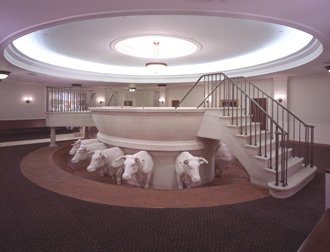Baptism for the Dead
Baptism for the Dead, or Proxy Baptism is the means whereby those who never had a proper opportunity to accept Christ in life may have the opportunity to be baptized.
Mormon doctrine teaches that baptism is a necessary ordinance to return back to Heavenly Father. Not only does the ordinance need to be performed, but it also must be done in the proper way and with the authority of Christ’s priesthood.
“Because all on the earth do not have the opportunity to accept the gospel during mortality, the Lord has authorized baptisms performed by proxy for the dead. Therefore, those who accept the gospel in the spirit world may qualify for entrance into God’s kingdom” (See Guide to the Scriptures). One thing that should be made perfectly clear about baptisms for the dead is that when a baptism is performed for a person, he has the option to accept or reject it. There is nothing in Mormon doctrine that says that the person who is being baptized by proxy must accept this ordinance. However, doing baptisms for the dead does at least give the person the ability to make a choice.
Baptisms for the dead can only be performed in temples. Apostle Mark E. Petersen explained this requirement,
- Always a center of interest is the baptismal font. In each of the temples this font rests upon the backs of twelve stone or bronze oxen, following in this, as in other particulars, the pattern given by the Prophet Joseph Smith as he instituted temple building in his day under the direction of the Lord. Why is there a baptismal font in the temple? Cannot people be baptized anywhere? The living, yes. But the font in the temple is for vicarious baptisms performed in behalf of the dead (Mark E. Petersen, “Why We Build Temples,” Tambuli, Oct. 1980, 34).
Baptism for the dead is an ordinance that has been performed throughout the history of Christ’s Church. In 1 Corinthians 15:29 it says,
- Else what shall they do which are baptized for the dead, if the dead rise not at all? why are they then baptized for the dead?
This statement teaches much in just two short sentences. A just and righteous God would not punish the millions of people who have lived on the earth who never had the opportunity to learn of the gospel and baptism. “The Savior himself declared that he was God of both the living and the dead, ‘for all live unto him’ (Luke 20:38), showing that he regards them all in the same light.” Baptism for the dead gives those who would have embraced Christ and His Church the opportunity to do so after death. Elder Mark E. Petersen went on to explain this fact:
- People who die without having been taught the gospel may yet be saved in the presence of God. This is made clear in the scriptures. But how? That is the question. Jesus preached to the dead. The Apostle Peter taught this in his day, saying that after the death of the Savior, and while his body lay in the tomb, the Lord, as a spirit, went to the realm of the dead and there preached to the spirits of the people who previously had lived on the earth (1 Peter 3:18–20). Then he gives us the reason for this preaching: “For this cause was the gospel preached also to them that are dead, that they might be judged according to men in the flesh, but live according to God in the spirit (1 Peter 4:6).
Elder Petersen went on to explain what these passages teach us:
- That Jesus was a Personage of both spirit and flesh, like all of us.
- That when Jesus went to the realm of the dead he was still himself, an individual, the humble “Carpenter from Nazareth,” although a spirit divested of his body of flesh and bones which had been crucified.
- That the dead—even those who died in the flood—also were intelligent persons, still individuals, although spirits like Jesus himself.
- That these dead were so much in possession of their reason and their faculties that they could hear the gospel like men in the flesh although they lived in a world of spirits, and that they were alive and alert and could use discretion in accepting or rejecting the teachings of Christ.
- That Jesus taught them the gospel, which was their opportunity for salvation.
- That having heard the gospel, they might accept it or reject it and thus be “judged according to men in the flesh.” As they did accept it they could then “live according to God in the spirit” just as the scripture indicated.
External Links
- Mormon Temples - Lightplanet
- Mormon Temple Ordinances - ReligionFacts
- FAIRlds:Baptism for the dead in ancient Christianity
